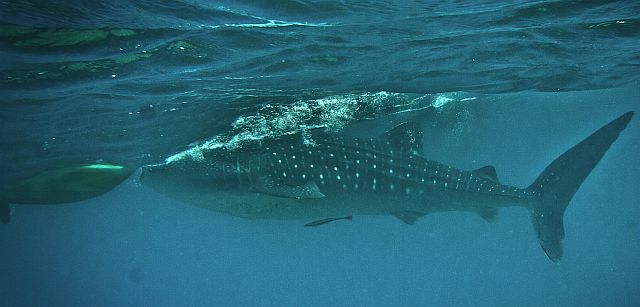
It remains unclear whether or not whale watching in Oslob will be part of the final show of the Miss Universe 2017 to be held in the Philippines in January next year; but Oslob town officials have surrendered to the possibility that chances of the town’s tourist attraction being featured in the pageant are slim. (CDN FILE PHOTO).
To be featured during the Miss Universe pageant next year would have brought a huge impact on the tourism industry in Oslob, southern Cebu, but recent developments have made that a less likely prospect.
Oslob Mayor Jun Tumulak surrendered to the possibility that the whale shark watching activity his town takes pride in may no longer be included in the pageant’s final show by January following criticisms from environmentalists and netizens.
“It was their (organizers) choice to go to Oslob maybe because the candidates wanted to see the whale sharks. But whatever their decision, I will not go against it. I’m just thankful they at least went to the town,” he told Cebu Daily News, referring to five candidates of the pageant who went to have an encounter with the large fish in Oslob during a quick visit to Cebu with five other candidates on Tuesday.
Netizens and environmentalists earlier took to social media their disappointment at the inclusion of the activity in the beauty queens’ itinerary as the pageant is supposed to be a platform that advocates environmental protection and social awareness.
The debate on whether whale shark watching in Oslob was right or wrong goes back five years ago when the once sleepy town first took the opportunity to draw more tourists with the “gentle giants” as sought-after attractions.
Tourists, both local and foreign, get to “interact” with the whale sharks, getting as close without touching and feeding them.
But environmentalists cited the perils of these activities, with human interaction threatening to change their behavioral and feeding patterns, especially because whale sharks are an endangered species.
Tumulak said they manage the activity better now than when it started five years ago and that the municipal council even came up with a whale shark watching ordinance, which penalizes, among others, direct contact with the fish, using camera flash, and applying sun block before diving.
He said tourists may be penalized up to P2,000 for violating these guidelines, all of which are mentioned during a briefing prior to the activity.
“We’re just thankful we were considered. If they won’t push through with it, then that’s their decision. If they reconsider, then we are willing to receive them and are prepared to assist them,” the mayor said.
“This would have great impact on the tourism in Oslob because the whole world will see us. Almost every country has a representative. Their awareness about the town and the whale shark will increase. If they had a chance to visit the Philippines again, they’ll definitely want to visit Oslob as well,” Tumulak added.
In a press conference in Lapu-Lapu City on Tuesday, Tourism Undersecretary Katherine de Castro said Oslob may no longer be featured in the final show to heed the clamor of various groups against it.
Nonetheless, she said they were still determined to feature the whale shark and might do it in Donsol, Sorsogon instead.
Elizabeth Benologa, Oslob municipal tourism officer, said that she still sees positive growth for tourism in the town despite this development.
“Whether Miss Universe came here or not, I am still positive. We don’t even advertise our activities, but people still come here because they heard about it from their friends,” she said.
She said that daily, there are an average of 100 to 200 tourists, both foreign and local, who visit Oslob to see the whale sharks.
Benologa said critics should take the time to visit the town as well to see how they manage the activity before making any conclusions.
She said they coordinate with local fisherfolk to enforce rules stated in the ordinance as well as a marine biologist on duty every day.
Cebu Provincial Tourism Officer Joselito Costas, meanwhile, said he believes whale shark tourism has uplifted the economic conditions of the locals.
However, he said the local government unit must look into a comprehensive visitor management strategy and limit the number of visitors in a day, for example, by setting higher prices.
He explained that in tourism, setting a higher price limits access and therefore minimizes the negative impact of activities because only a few tourists can afford.
“By analogy, it is like buying an expensive luxury item — swimming with whale sharks is one of those luxurious experiences which only the privileged can afford,” he said.
However, Vince Cinches, oceans campaigner for Greenpeace Philippines, said they intend to meet officials of the Department of Tourism (DOT) to remind the agency of its previous commitments to end whale shark feeding in Oslob.
He said several environmentalists have already spoken to Undersecretary De Castro and that she said she supported the initiative of groups to push for the regulation of marine wildlife interaction in the tourism industry.
“Hopefully, this will be settled before the Miss Universe activity in Cebu,” he said.
Cinches said they already sent letters to DOT, but have not received any feedback yet.
Environmental advocates in the country have pointed out that whale shark feeding was among unsustainable tourism practices that should be stopped.